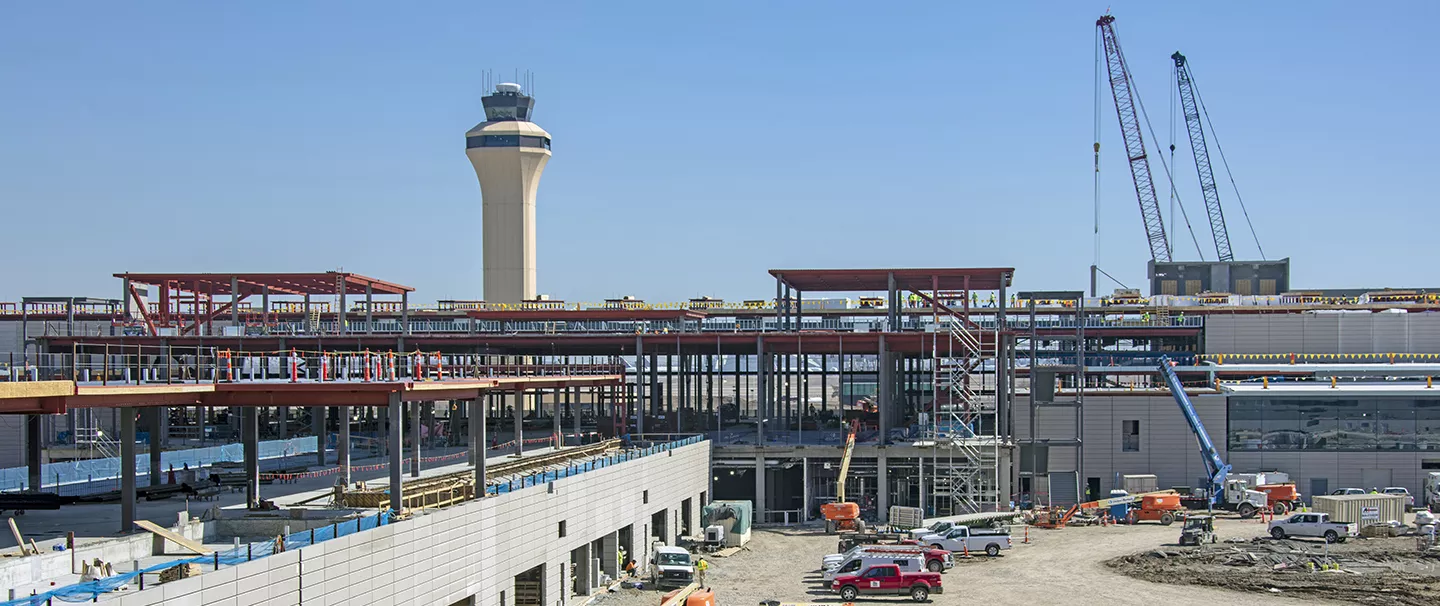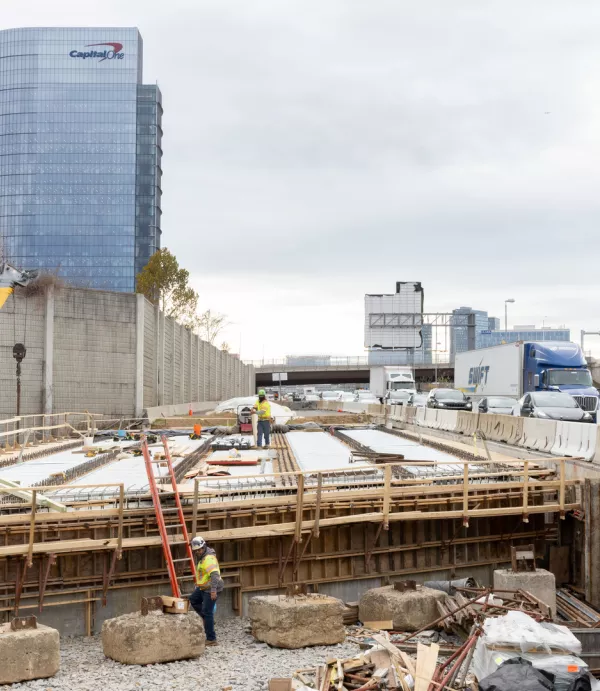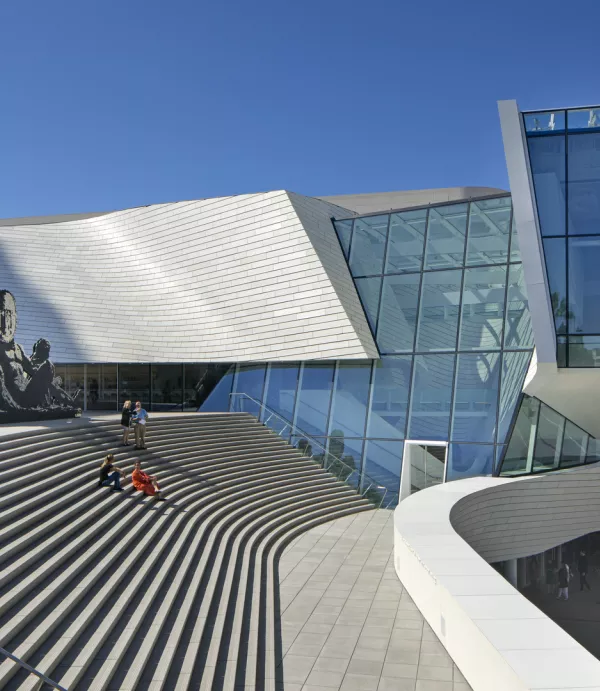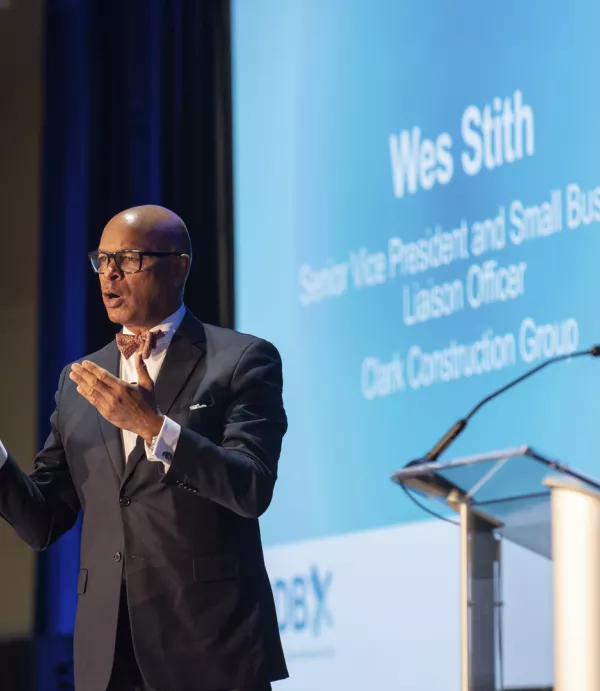New Terminal Project at KCI Spurs Economic Growth, Capacity Building Among Diverse Local Businesses
April 8, 2021

Two years prior to opening for air travel, the New Terminal has hit cruising altitude with the help of more than 115 Kansas City-based minority- and women-owned firms.
When Kansas City officials set their sights on developing a new terminal for the City's aging airport, one word summarized their aspirations for the project: transformational. As the largest single infrastructure project in the City’s history, the New Terminal at Kansas City International Airport was seen as a bridge to Kansas City’s future and represented an opportunity to define a new way of doing business. City leaders sought a partner with the credentials to develop a world-class facility that would modernize the traveler experience and elevate Kansas City’s profile nationally. Equally important, they wanted a partner that would prioritize the utilization, growth, and development of Kansas City-based companies, specifically the minority-owned (MBE) and women-owned (WBE) business enterprises that had historically been underrepresented on past large-scale construction projects.
A Transformation by the Numbers:
- 48% of project partners that are MBE/WBE firms
- $290 million of work awarded to MBE/WBE firms larger
- 2-10x larger contract size for MBE/WBE firms working on the New Terminal project as compared to other MBE/WBE contracts in KC
Tapped to spearhead the $1.5 billion project in 2017, developer Edgemoor Infrastructure & Real Estate, and design-builder Clark Construction, along with construction joint venture partners Clarkson Construction and The Weitz Company and designer Skidmore, Owings, & Merrill, promised City leaders the New Terminal would reach transformative levels of diversity, spur economic growth for minority and women-owned businesses, and help develop Kansas City’s future construction workforce. Affirming their commitment to achieving transformational results, the team established goals for minority- and women-owned business participation that, based on market capacity in Kansas City, were ambitious and historic: 20 percent MBE and 15 percent WBE participation for both professional and construction services contracts.
Over the last three years, the Clark and Edgemoor-led New Terminal team has worked with purpose to deliver on their commitments to the Kansas City community, implementing a procurement strategy designed to maximize the inclusion of diverse businesses. In addition, the team launched a program to provide benefits to the community, including more than a half dozen innovative programs to help small, disadvantaged, minority- and women-owned businesses gain access to the training, critical start-up capital, and construction equipment they need to secure contracts, and realize success, on a project of this magnitude.
First-of-their-kind initiatives such as the Pay Without Delay, Low Interest Loan, and KCI Supplier Support programs have been transformative, providing the necessary financial assistance to eliminate known barriers to success and help small businesses grow.
Pay Without Delay Program ensures firms are paid within 14 days for their completed work.
- More than two-thirds of the minority- and women-owned firms on the project have enrolled in the program.
Low Interest Loan Program partners with local financial instution Lead Bank to help minority- and women-owned firms acquire equipment and working capital.
- Since the program’s inception, approximately $7 million has been loaned to minority- and women-owned businesses.
KCI Supplier Support Program allows minority- and women-owned contractors to leverage Clark’s purchasing power to rent or buy equipment to support their operations on the New Terminal.
- Clark has provided access to rentals totaling more than $1.5 million.
Clark’s Strategic Partnership Program (KC SPP), which debuted in Kansas City in 2018, has also served as an important mechanism for capacity building. Designed to increase the size, scope, and scale of small businesses, the six-month-long, executive MBA-style course has served as a springboard to new opportunities for many of its participants. To date, 14 of the KC SPP’s 88 graduates have been awarded contracts to work on the New Terminal totaling more than $63 million. For many, the project represents their largest contract to date and has enabled them to hire new employees and acquire new capital to support their endeavors. Fifteen Kanas City small business owners are currently enrolled in the current SPP class.
The team’s intentional procurement strategy also set a high bar for diverse business participation – and held the project’s large trade partners to that same standard. Prime subcontractors were required demonstrate their plans to maximize local participation and create meaningful opportunities for small businesses to contribute within their scopes of work. Trade partners rose to the challenge, often hosting their own open house events to build out their diverse and qualified local team. Through procurement workshops, the design-build team also encouraged strategic partnerships to help small businesses gain experience working alongside larger, more established firms in their field. Their efforts opened the doors to a dozen formal and impactful collaborations, including six mentor/protégé agreements and six joint venture partnerships between large and small firms.
With nearly two years of construction underfoot, the New Terminal team’s efforts are coming to bear. Last fall, project leaders joined Kansas City Mayor Quinton Lucas and Aviation Director Pat Klein to celebrate the 100 Kansas City-certified minority- and women-owned businesses that had been awarded contracts on the project. Today, that number has expanded to include 117 small, diverse firms performing nearly 260 scopes of work, and gaining valuable experience that will support their growth, and better position them for future opportunities in the region.
“From day one, our team has worked to ensure this project is transformational by providing both meaningful economic opportunities for diverse businesses and the support and tools needed to help them succeed,” said Mark Goodwin, Clark’s vice president in charge of design and construction efforts on the New Terminal. “We’re proud of the talented minority- and women-owned firms who are helping us build. It is incredibly rewarding to see them grow and thrive on the jobsite.”
No longer an aspirational goal, the transformation in Kansas City is in full effect. Today, minority- and women-owned firms represent 48 percent all New Terminal project partners and have been awarded more than $290 million in contracts of the $950 million of subcontracted work. An additional $4.9 million in contract awards are still pending. The average contract sizes for minority- and women-owned businesses working on the project range from more than double, to nearly 10 times the size of the average MBE and WBE city contracts in KC.
Among the project’s success stories is Daniel Felder, co-owner of Axiom Construction, a certified minority-owned business. A graduate of the Kansas City Strategic Partnership Program, Felder has taken advantage of many of the small business support programs offered and has significantly grown his concrete firm’s capacity by working on the New Terminal project. “The project team has created a culture of inclusion,” said Felder. “All voices being heard, and all having an opportunity to engage.”
Zxiom secured $2 million in working capital through the project’s Low Interest Loan program and landed two New Terminal contracts totaling more than $14 million. The company’s previous largest contract totaled $1.2 million. Axiom has also benefitted from the experience and guidance of several practiced construction firms with which the company has three formal mentor/protégé arrangements.
In December, Clark and Edgemoor garnered national recognition for keeping diversity, inclusion, and equity at the forefront of the New Terminal project, earning an Innovations in Diversity 2020 award from Profiles in Diversity Journal.
“From the outset, our goal has been to drive the long-term growth and prosperity of diverse businesses in Kansas City,” said Geoff Stricker, Edgemoor’s senior managing director. “We are honored to receive recognition for rolling out programs that remove barriers typically impacting small, disadvantaged, minority, and women-owned businesses from securing contracts to work on projects of this magnitude.”
Like Daniel Felder, Fahteema Parrish, owner of Parrish & Sons Construction, a Kansas City-certified minority- and women-owned business, is also realizing her firm’s full potential and building a future for her family through her work on the New Terminal. Parrish & Sons has been awarded multiple contracts for earthwork on the project totaling $5.8 million. “I absolutely believe that the KCI New Terminal Project is a transformative project for us. We are on our way to creating a legacy business for our four sons,” noted Parrish.
More than just a modern-day transportation hub, the New Terminal represents a significant infusion of capital into Kansas City small businesses during an unprecedented and critical time in our nation. As a result of the New Terminal project team’s comprehensive strategy to build capacity, break down barriers, and foster inclusion, small, diverse business owners have grown their teams, acquired new capital, and developed the knowledge needed to win and perform work on large-scale projects. Kansas City’s construction workforce is stronger for it. With nearly two years left in the construction schedule, the project team’s work is far from complete, but it’s trending in the right direction – up.


